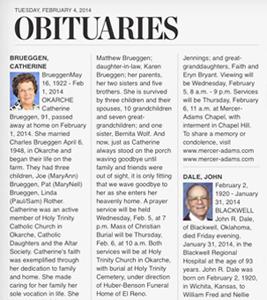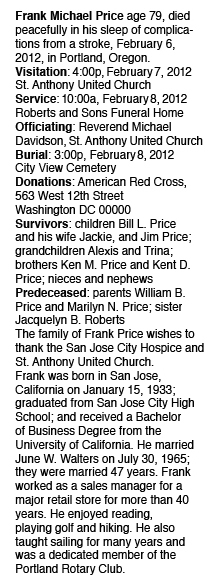
A better way to write and lay out obituaries
You've seen the pages in the newspaper of death announcements (or you will as you get older). They look like legal notices, not too enticing to read. Publishing an obituary is an often necessary, but awkward part of dealing with the death of a loved one. There was a time when a phone call and the newspaper were the primary sources for learning of who passed away. Reading the morning newspaper was quite common. Not so much anymore. Facebook may now even be a primary source of death news. Or emails from survivors.

Our source of news, local and familial, has changed and our reading habits have changed. Today, most people scan info to find what is important to them. Writing an obituary is challenging. Not only are you faced with the loss of a loved one, but you have probably never written an obituary. There are many online sites with tips, suggestions, formats, and sample obituaries for print submissions. Online obits often follow a format set up by the medium.

The web page above has a menu heading for Facts in a list format. Below, the readability of copy set flush left, ragged right is apparent. The Obituaries list the important info in the first sentence


The design, content and layout, of print obituaries needs to adapt.
Sample of posting in Newspapers
Jim Watson, age 84, of Dallas and Edmond OK, passed away
on October 31, 2034, of complications from Hard Partying.
For a complete obituary, service info, and to leave
leave condolences: www.jamesrobertwatson.com
Objectives
• Easy navigation, allow the reader to scan info easily
• Easy reading, simple, clear, straightforward
• Few words, keep costs low (typically newspapers charge per word)
• Pertinent, not too verbose and flowery
• Accurate, names and organizations spelled correctly and correct funeral service information
Target audience
1. Immediate family
2. Close friends
3. Extended family
4. Friends, co-workers, colleagues
5. Curious readers
Improvements
I am often frustrated when I read an obit but there is no mention of how the person died. I have talked to others who agree - we would like to know what happened, how did the person die.
• Include the cause of death. Use good judgment, especially if the death was gruesome, involved illegal activity or was a suicide.
• Set copy FLRR, not justified (avoid the awkward letter and word spacing)
• Allow scanning - use bold headings
• Put info in lists, not prose or complete sentences
Sample suggested contents
Name
Age
Cause of death (leukemia, car crash, liver cancer, complications from a stroke, etc.)
Date of death (include the day of week, month, date and year.)
Place of death ("Hospice", "Hospital", "at home", etc.)
Many start with the line "after a long and courageous battle against..." that usually mask months or years of suffering for the patient and for the family: indignities, medical interventions, anguish, and trauma for the family members that must witness the slow disintegration of the person they loved. A better obituary could proudly announce the deceased's decision to remain in control: "When Fred found out he had Disease X, he sought every reasonable medication and procedure to restore health and maintain a good quality of life. When it became clear that this wasn't possible, Fred thanked his medical team and moved on to palliative care that would enable him to have a brief window of relatively pain-free time.
Service/Funeral/Memorial/Graveside (day, month, year, time and location)
People (Officiant, Pallbearers, Honorary Pallbearers and other significant people)
Visitation (day, month, year, time and location)
Reception (day, month, year, time and location)
Burial/Internment/Entombment/Wake/Vigil (choose one) follows: (day, month, year, time and location)
Funeral home
Memorial website (URL)
Donations (organization and location)
Survivors (spouse, children and spouse, grandchildren, great-grandchildren, parents, grandparents, siblings and spouses, nieces, nephews and other relatives; Include name, relation and location of survivors. If there are too many to list, simply write "nieces and nephews" or "grandchildren")
Predeceased (name and location of any family who have already passed away; parents, spouse, children, grandchildren, siblings and other relatives)
Special pets
Thank you (people and organizations)
Date and place of birth
Place of current residence, native residence
Childhood: siblings, stories, schools, friends
Marriage (spouse, wedding date and location)
Education (High School, College, Trade School and degree(s)/certificate(s) obtained)
Military Information (status, where served, discharge)
Employment (previous job(s), position and promotions)
Achievements (designations, awards, recognitions, accomplishments)
Hobbies (interests, activities and sports)
Associations (fraternal, political, charitable, and religious)
Personality traits, anecdotes, stories
Text (poem, hymn, verse, quote or other significant phrase)
Closing words that sum up the life
Samples: Existing and Proposed











An obituary I Would Like to See
By Janis Landis
An obituary that recognizes and celebrates taking control of one's end-of-life suffering. You have probably read countless loving tributes to deceased family members that start with the line "after a long and courageous battle against..." Simple words that usually mask months, possibly years, of suffering for the patient and for the family. Countless indignities, unwelcome medical interventions, anguish for the patient, and trauma for the family members that must witness the slow but inevitable dismantling of the person they loved without being able to relieve the suffering. The obituary I would like to read would overturn the standard phrases and proudly announce the deceased's decision to remain in control:
"When Fred found out he had Disease X, he sought every reasonable medical intervention to restore his health and maintain a good quality of life. When it became clear that this was not possible, Fred thanked his medical team and moved on to palliative care that would enable him to have a brief window of relatively pain-free time. He took some of the money that would have gone into co-pays for nursing homes, emergency tracheotomies, toxic drugs, and experimental treatments - and treated his family to a blowout Wait Disney World cruise. Then he returned home, and with his loved ones around him, serenely ended his life. In those final moments he was comforted in knowing that his spouse and his family would have only wonderful memories of him fully engaged in life and being his true self, not some emaciated figure lying in a bed, whimpering in pain and with tubes and monitoring equipment around him."
Obviously Fred did not win the war against death. None of us will. But he won the war against needless suffering. And by the way, while financial reasons should never be the cause for an individual to end their life, perhaps he realized that the monetary resources he was leaving behind would be another gift to his family. I would guess that in those final moments Fred thought about the money for his grandkids' tuition still available in his bank account and he was proud of the choices he had made for him and his family. I would like to witness the exit of obituaries that treat unnecessary suffering as courage and the acceptance of pain as a form of victory.